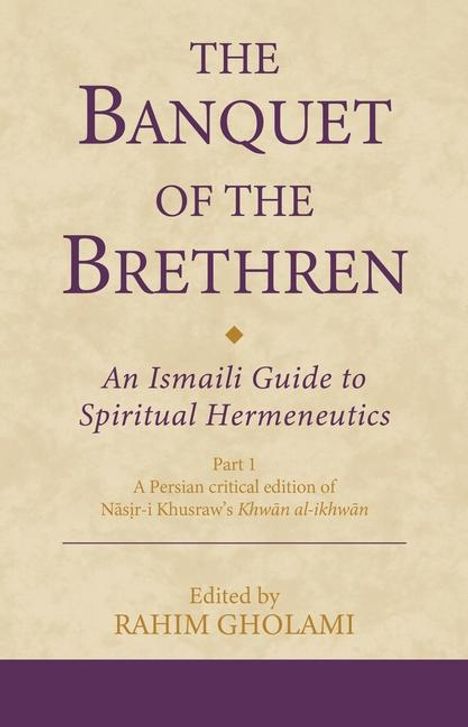The Banquet of the Brethren, Kartoniert / Broschiert
The Banquet of the Brethren
- An Ismaili Guide to Spiritual Hermeneutics: Part 2 an English Translation of Nasir-I Khusraw's Khwan Al-Ikhwan
Sie können den Titel schon jetzt bestellen. Versand an Sie erfolgt gleich nach Verfügbarkeit.
- Herausgeber:
- Rahim Gholami
- Verlag:
- Bloomsbury Academic, 07/2026
- Einband:
- Kartoniert / Broschiert
- Sprache:
- Englisch
- ISBN-13:
- 9780755654765
- Artikelnummer:
- 11934179
- Umfang:
- 496 Seiten
- Nummer der Auflage:
- 26002
- Ausgabe:
- 2nd edition
- Gewicht:
- 454 g
- Maße:
- 216 x 138 mm
- Stärke:
- 25 mm
- Erscheinungstermin:
- 23.7.2026
- Hinweis
-
Achtung: Artikel ist nicht in deutscher Sprache!
Weitere Ausgaben von The Banquet of the Brethren |
Preis |
|---|---|
| Buch, Gebunden, Englisch | EUR 162,29* |
Klappentext
I. B. Tauris in association with the Institute of Ismaili Studies The Ismaili missionary and poet, Nasir-i Khusraw (d. after 462), wrote Khwan al-ikhwan (The Banquet of the Brethren) when he was living in his remote mountain refuge of Yumgan in Badakhshan. It is a work of philosophical theology and a reflection of the learning of the age consisting of a sequence of dynamic arguments for divine unicity (tawhid ), the authority of the Prophet Muhammad, his legatee, 'Ali b. Abi Talib, and his descendants, the imams from the line of Isma'il b. Ja'far al-Sadiq. Originally written in Persian, Khwan al-ikhwan includes a precis of ideas found in a work by an earlier da'i , Abu Ya'qub al-Sijistani (d. ca. 361), the Kitab al-Yanabi' , which Nasir-i Khusraw recast and then extended in 100 chapters.
The current publication is an English translation, which is the first translation of Khwan al-Ikhwan in any language outside the Persian milieu. It includes an extensive introduction that discusses Khwan al-ikhwan in the context of both Nasir-i Khusraw's other works and al-Sijistani's Kitab al-Yanabi' , as well as the role of ta'wil (allegorical or esoteric interpretation) in the Ismaili understanding of the message of the Revelation. This makes the work of Nasir-i Khusraw further available to a wider audience and opens up for the reader the intellectual world of the 5th century in all its sophistication and variety.


